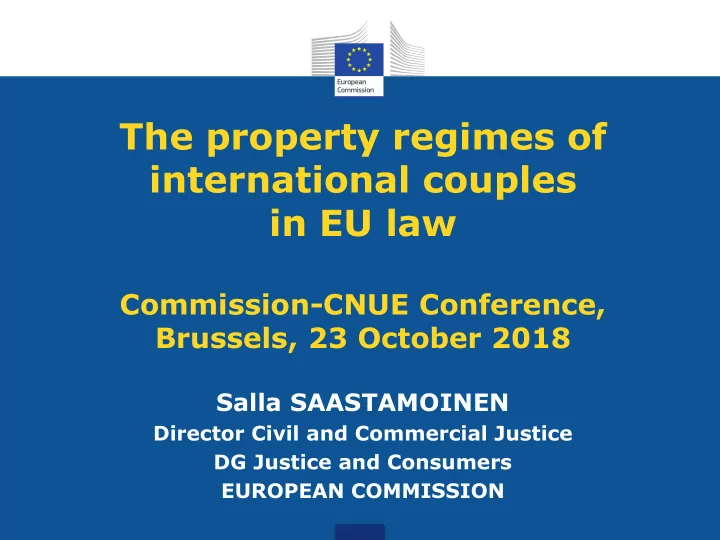

The property regimes of international couples in EU law Commission-CNUE Conference, Brussels, 23 October 2018 Salla SAASTAMOINEN Director Civil and Commercial Justice DG Justice and Consumers EUROPEAN COMMISSION
Introduction • Citizens are increasingly mobile. Union law had already adopted common rules on divorce, parental responsibility, maintenance and successions • One question was outstanding: the property regime of international couples • European Council called for solutions on this matter, and this was reflected in the 2000 Council programme on measures implementing the principle of mutual recognition • Today, matters on property regimes concern: - 16 million international couples in the Union - over 460 million EUR when these couples separate or one of the couple's members dies
Added value: enhanced cooperation • In order to bring to international couples the benefits of common provisions on their property regimes, a majority of MS decided to adopt regulations in this area by enhanced cooperation • 18 MS participate in enhanced cooperation: SE, BE, EL, HR, SI, ES, FR, PT, IT, MT, LU, DE, CZ, NL, AT, BG, FI, CY • As requested by 18 MS, COM proposals for the regulations were based on the compromise texts negotiated by MS before the establishment of enhanced cooperation
Added value: enhanced cooperation • Proposals under enhanced cooperation provided for: => 1 single area of enhanced cooperation covering the property regimes of both marriages and registered partnerships to ensure equal treatment => simultaneous adoption of, and joining to, the regulations => safeguards to respect the legal traditions of MS: - possibility to decline jurisdiction - no obligation to recognise marriages and registered partnerships concluded in another MS • Regulations adopted by 18 MS on 24 June 2016 • Regulations applicable as from 29 January 2019
Overall added value • Regulations complete the programme on mutual recognition of decisions in civil and commercial matters adopted by Council in 2000 • Regulations fill an important gap in the field of Union family law • Regulations will facilitate the application of Union instruments on divorce and succession, as a couple's property must be divided in these situations • Regulations cover a majority of Union international couples: the 18 MS participating in enhanced cooperation represent almost 70% of Union population • Any MS can join enhanced cooperation (both Regulations) at any time
Specific added value • International couples in the Union currently face difficulties when managing their property on a daily basis or when sharing it in case of divorce or the death of one of their members • Regulations will help international couples, whether married or in a registered partnership: i) to know which courts should deal with matters concerning their property ii) to know which national law should apply to such matters iii) to have court decisions and authentic instruments issued by notaries on these matters recognised and enforced in another MS under simplified rules • By providing legal certainty and easing the circulation of decisions and authentic instruments, Regulations will reduce costs of proceedings and facilitate free movement of citizens
No negative impact • Regulations will have no negative impact for MS not participating in enhanced cooperation: - non-participating MS will continue to apply their national rules of private international law to the property regimes of marriages and registered partnerships - application of Regulations will not depend on the nationality of citizens: authorities of MS participating in enhanced cooperation must apply the Regulations to all citizens regardless of nationality - agreements concluded (i) between MS and third countries, and (ii) between participating and non- participating MS, are not affected
Importance of enlarging participation • Enhanced cooperation and the Regulations provide benefits to couples while respecting national law: • - they do not harmonise the substantive law of Member States on the property regimes of couples • - they do not require the recognition of a marriage or a registered partnership concluded in another Member State • - substantive legislation on marriage and registered partnerships will continue to be determined at national level • I thus encourage all Member States to join the enhanced cooperation, because the greater the number of participating Member States, the greater the number of citizens that will benefit from clear and simplified common rules
Recommend
More recommend